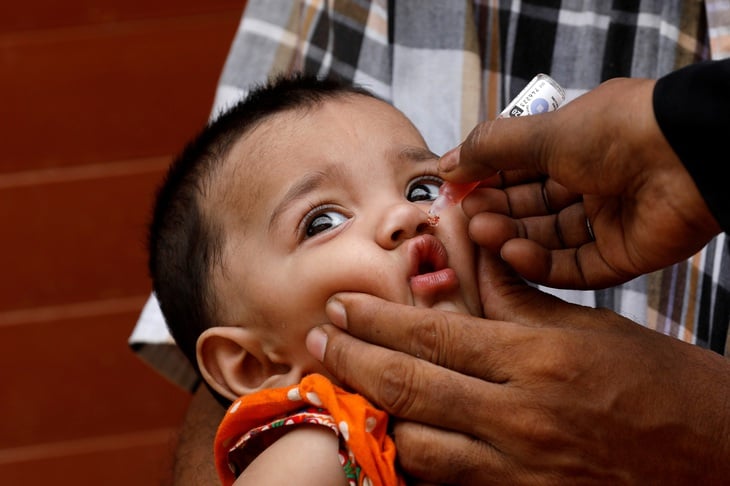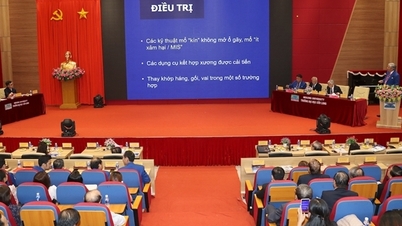
Vaccines are the direct factor leading to the near-eradication of polio, according to experts - Photo: REUTERS
The AAP FactCheck organization has confirmed that the rumor that "vaccines are not the reason for the decline in global polio cases" is false. Experts emphasize that vaccines are the factor that has helped the number of cases of this disease drop rapidly.
Vaccines help reduce paralytic polio cases
The false claim appeared in a Facebook post, which included an excerpt from The Joe Rogan Experience podcast with guest Suzanne Humphries, who has previously been fact-checked.
“The data shows polio still exists,” she said, rejecting the medical consensus that polio vaccines have helped eliminate the disease in many parts of the world , including Australia. She also said changes in diagnosis and definition had created a false perception of the current state of the disease.
But experts told AAP FactCheck that vaccines are directly responsible for the near eradication of the disease. Polio, or poliomyelitis, is an infectious disease caused by the poliovirus. While most people who contract it have only mild symptoms, a small number can become permanently paralyzed – known as paralytic polio.
Bruce Thorley, chief investigator of Australia's National Polio Surveillance Program, said cases had fallen sharply globally since the vaccine was introduced in the 1950s.
He cited World Health Organization (WHO) data showing that since the Global Polio Eradication Initiative (GPEI) began in 1988, wild polio cases have fallen by more than 99.9%, from about 350,000 to just six in 2021.
In Australia, the oral vaccine is no longer used. The country was declared polio-free in 2000.
Misleading claims about vaccines
AAP FactCheck contacted Humphries to ask for evidence to support her claim. Roman Bystrianyk, her co-author of the self-published book Dissolving Illusions: Disease, Vaccines, and the Forgotten History , responded by citing the chapter on polio.
One of their main arguments is that diagnostic criteria were tightened soon after the introduction of vaccines in the 1950s.
Previously, paralysis was often attributed to the polio virus, though it could have been caused by many other factors. Before the vaccine, patients weren't specifically tested for the virus, Humphries said in the podcast.
Thus, cases of paralysis due to other causes, even DDT, lead, or arsenic poisoning, may have been misclassified as polio, leading to inflated figures.
Ms Humphries also argues in both the podcast and the book that the use of poisons like DDT, lead and arsenic in the first half of the 20th century may have been responsible for many cases of paralysis being misdiagnosed as polio.
However, Professor Paul Griffin, an infectious disease expert at the University of Queensland (Australia), said this argument is inconsistent with medical history.
"The vast majority of paralytic polio cases occur in children, 80-90% of whom are under five years old," he said. "It is unlikely that young children are most exposed to pesticides or other toxins." He also stressed that the symptoms of paralytic polio are distinctly different from those of arsenic, lead or DDT poisoning.
Wild polio is now endemic in only two countries: Afghanistan and Pakistan. Professor Griffin said this further proves that vaccines are the key factor in almost eradicating the disease, as both countries have low vaccination rates.
By 2023, the vaccination rate for one-year-old children in Afghanistan will be 68%, and 86% in Pakistan, up slightly from 65% in 2013, according to WHO and UNICEF. In Australia, it will reach 92.65% by 2024.
Nicola Stonehouse, a molecular virologist at the University of Leeds (UK), said the re-emergence of polio in Gaza shows the importance of maintaining vaccination. In 2024, a 10-month-old unvaccinated baby was found to have paralytic polio - the first case in Gaza this century.
“The recent cases in Gaza were linked to poor sanitation, but if vaccination had been maintained that would not have been an issue,” said Professor Stonehouse. The WHO then launched a vaccination campaign in Gaza, where conflict has left thousands of people without access to vaccinations.
Source: https://tuoitre.vn/vac-xin-truc-tiep-gop-phan-giup-giam-nhanh-benh-bai-liet-the-liet-20250803142259137.htm





![[Photo] "Ship graveyard" on Xuan Dai Bay](https://vphoto.vietnam.vn/thumb/1200x675/vietnam/resource/IMAGE/2025/11/08/1762577162805_ndo_br_tb5-jpg.webp)


































![[Video] Hue Monuments reopen to welcome visitors](https://vphoto.vietnam.vn/thumb/402x226/vietnam/resource/IMAGE/2025/11/05/1762301089171_dung01-05-43-09still013-jpg.webp)





































































Comment (0)